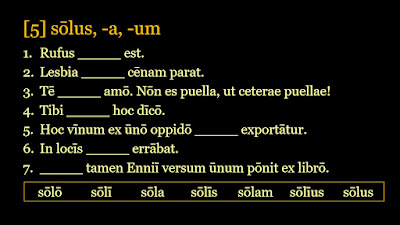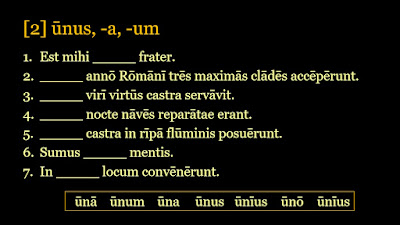nūllus can be:
[1] an adjective: no, in the sense of “not any”
Nūlla victōria Rōmānīs grātior fuit │ No victory was more pleasing to the Romans.
Miser erat Lūcius; nam nūllī eum puerī, nūllae amāvērunt puellae. │ Lucas was miserable; for no boys loved him, and no girls did either.
Bellum nūllum gessit │ He waged no war = He did not wage any war
homō nūllīus colōris │ (Proverb) literally: a man of no colour i.e. neither fish nor fowl
[2] a pronoun: [i] no one; nobody [ii] none, not any, nothing
aut Caesar aut nūllus erō │ I shall either be a Caesar or a nobody
Ibi nūllus timet mortem / Sed prō Bacchō mittunt sortem │ Nobody fears death there / But they throw the dice in the name of Bacchus
Cicero usually emphasises the point by saying it three times; this time, however, it’s four …
ut nūllīus rēs tūta, nūllīus domus clausa, nūllīus vīta saepta, nūllīus pudīcitia mūnīta contrā tuam cupiditātem et audāciam posset esse (Cicero)│ so that no man's estate could be safe, no man's house closed; no man's life protected, no woman's chastity fortified, against your cupidity and audacity
It’s interesting to note that, in that tirade, he leaves the worst till last i.e. the offence against women
[3] an extension of nūllus is nōnnūllus, -a, -um, literally meaning not none i.e. some, several, a few; it can also be written as two separate words: nōn nūllus
Like nūllus, it can be used as an adjective or a pronoun.
nōn nūllum perīculum est (Plautus) │ there is some danger
nōnnūlla pars mīlitum domum discēdit (Caesar) │ some part i.e. some of the soldiers returned to their homes
nōnnūllae cohortēs in agmen Caesaris, … incīdunt (Caesar) │ several cohorts fell in with the main body of Caesar's army
Frūmentī cōpiam legiōnāriī nōnnūllam habēbant (Caesar) │ the legionaries had a tolerable supply [ = some] supply of corn
nōnnūllās (nāvēs) cum hominibus capiunt (Caesar) │ they took a few (ships) with the men (on board)
These two examples show nōnnūllus as a pronoun:
nōnnūllī suā voluntāte apud eum remānsērunt (Caesar) │ several voluntarily remained with him
Dīcuntur etiam ab nōnnūllīs sententiae (Caesar) │ Opinions were expressed by some
Quid dē nōnnūllōrum senātōrum impudentiā dīcam? │ What shall I say about the shamelessness of several senators?
Image #2: Latin has a specific word for nobody i.e. nēmō; it can be either masculine or feminine. However, the genitive and ablative of nēmō i.e. nēminis and nēmine were not used in Classical Latin, the genitive and ablative of nūllus used instead.
Exercise: Complete the Latin sentences with the appropriate form of nūllus:
[1] I’m a worthless fellow [ = I’m a nobody] │_____ sum (Plautus)
[2] She does not love anybody / she loves no one │ _____ amat.
[3] No sound passed his lips [ = no voice was heard from him] │ _____ vōx est ab eō audīta.
[4] We did not see any / we saw no ships in the harbour. │ _____ nāvēs in portū vīdimus.
[5] Cato did not say a word [ = made no word] │ Catō _____ verbum fēcit.
[6] The teacher does not give a reward to any bad boy. │ _____ malō puerō praemium dat magister.
[7] When Claudius and Aemilius were praetors, no thieves were condemned. │ Claudiō et aemiliō praetōribus, _____ latrōnēs damnātī sunt.
[8] I am not disturbed by any hope [ = I am disturbed by no hope], not by any fear [ = by no fear]; I am not disquieted by any rumours [= by no rumours] │ _____ spē, _____ timōre sollicitor, _____ rūmōribus inquiētor (Pliny)
[9] if I fear neither the violence of any one nor the influence of any one │ Sī _____ vim, _____ potentiam pertimuerō (Cicero)
nūlla; nūllā; nūllās; nūllī; nūllī; nūllīs; nūllīus; nūllīus; nūllō; nūllum; nūllum; nullus
____________________
[1] Nūllus sum (Plautus)
[2] Nūllum amat.
[3] Nūlla vōx est ab eō audīta.
[4] Nūllās nāvēs in portū vīdimus.
[5] Catō nūllum verbum fēcit.
[6] Nūllī malō puerō praemium dat magister.
[7] Claudiō et Aemiliō praetōribus, nūllī latrōnēs damnātī sunt.
[8] nūllā spē, nūllō timōre sollicitor, nūllīs rūmōribus inquiētor (Pliny)
[9] sī nūllīus vim, nūllīus potentiam pertimuerō (Cicero)



























